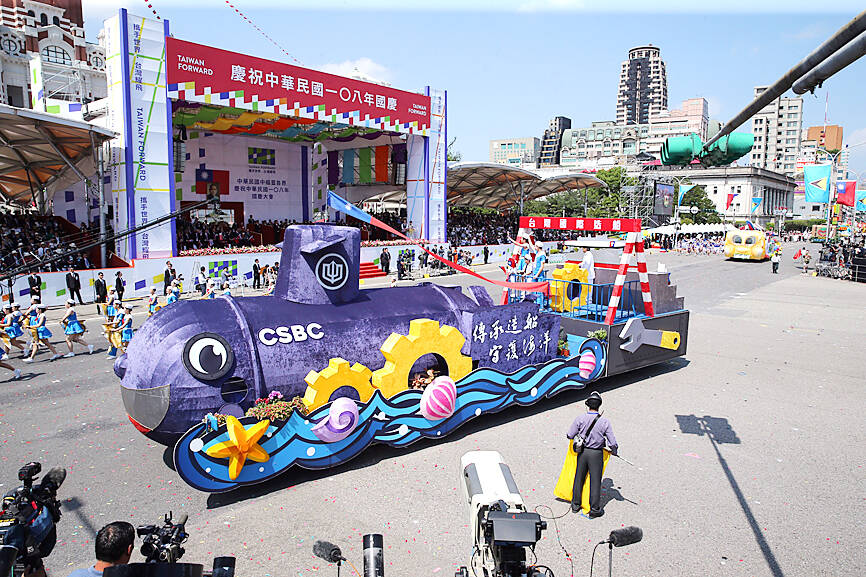The navy has formed an ad hoc unit as it prepares to take delivery of the nation’s first domestically manufactured submarine, a source familiar with the matter said yesterday.
The team was formed earlier this month under the navy’s 256th Submarine Squadron, the source said on condition of anonymity, adding that this is the first time in 37 years that such a unit has been put together to take delivery of a new submarine.
The last time a unit was formed under the squadron was in 1986, when representatives were sent to the Netherlands to take delivery of two Chien Lung (Sword Dragon) class submarines, the source added.

Photo: CNA
Cheng Wen-lon (鄭文隆), chairman of local shipbuilder CSBC Corp, which is constructing the domestic sub, in May said that a ceremony to launch the vessel would take place in September.
However, the launch would just be ceremonial, as CSBC and the navy must still conduct a series of tests on the prototype before it is delivered to the navy, Cheng said in an interview.
Cheng did not say when he expected the prototype to go into service.
However, he said that nearly 1,000 people are involved in the domestic submarine project, including 40 from the 256th Submarine Squadron.
The squadron is in charge of operating and managing the navy’s existing submarine fleet, which, in addition to the two Dutch Chien Lung-class subs, includes two World War II vintage subs purchased from the US in the 1970s, the ministry said.
However, the two US-made Gabby class subs are now used for training purposes only.
Overall, Taiwan has allocated NT$49.36 billion (US$1.58 billion) from 2019 to 2025 to build the prototype, as part of its plan to launch an indigenous submarine program to make it less dependent on other countries.

Taiwan has received more than US$70 million in royalties as of the end of last year from developing the F-16V jet as countries worldwide purchase or upgrade to this popular model, government and military officials said on Saturday. Taiwan funded the development of the F-16V jet and ended up the sole investor as other countries withdrew from the program. Now the F-16V is increasingly popular and countries must pay Taiwan a percentage in royalties when they purchase new F-16V aircraft or upgrade older F-16 models. The next five years are expected to be the peak for these royalties, with Taiwan potentially earning

STAY IN YOUR LANE: As the US and Israel attack Iran, the ministry has warned China not to overstep by including Taiwanese citizens in its evacuation orders The Ministry of Foreign Affairs (MOFA) yesterday rebuked a statement by China’s embassy in Israel that it would evacuate Taiwanese holders of Chinese travel documents from Israel amid the latter’s escalating conflict with Iran. Tensions have risen across the Middle East in the wake of US and Israeli airstrikes on Iran beginning Saturday. China subsequently issued an evacuation notice for its citizens. In a news release, the Chinese embassy in Israel said holders of “Taiwan compatriot permits (台胞證)” issued to Taiwanese nationals by Chinese authorities for travel to China — could register for evacuation to Egypt. In Taipei, the ministry yesterday said Taiwan

‘LIKE-MINDED PARTNER’: Tako van Popta said it would be inappropriate to delay signing the deal with Taiwan because of China, adding he would promote the issue Canadian senators have stressed Taiwan’s importance for international trade and expressed enthusiasm for ensuring the Taiwan-Canada trade cooperation framework agreement is implemented this year. Representative to Canada Harry Tseng (曾厚仁) in an interview with the Central News Agency (CNA) said he was increasingly uneasy about Ottawa’s delays in signing the agreement, especially as Ottawa has warmed toward Beijing. There are “no negotiations left. Not only [is it] initialed, we have three versions of the text ready: English, French and Mandarin,” Tseng said. “That tells you how close we are to the final signature.” Tseng said that he hoped Canadian Prime Minister Mark Carney

POSITIVE DEVELOPMENT: Japan and the US are expected to hold in-depth discussions on Taiwan-related issues during the meeting next month, Japanese sources said The holding of a Japan-US leaders’ meeting ahead of US President Donald Trump’s visit to China is positive news for Taiwan, former Japan-Taiwan Exchange Association representative Hiroyasu Izumi said yesterday. After the Liberal Democratic Party’s landslide victory in Japan’s House of Representatives election, Japanese Prime Minister Sanae Takaichi is scheduled to visit the US next month, where she is to meet with Trump ahead of the US president’s planned visit to China from March 31 to April 2 for a meeting with Chinese President Xi Jinping (習近平). Japan and the US are expected to hold in-depth discussions on Taiwan-related issues during the